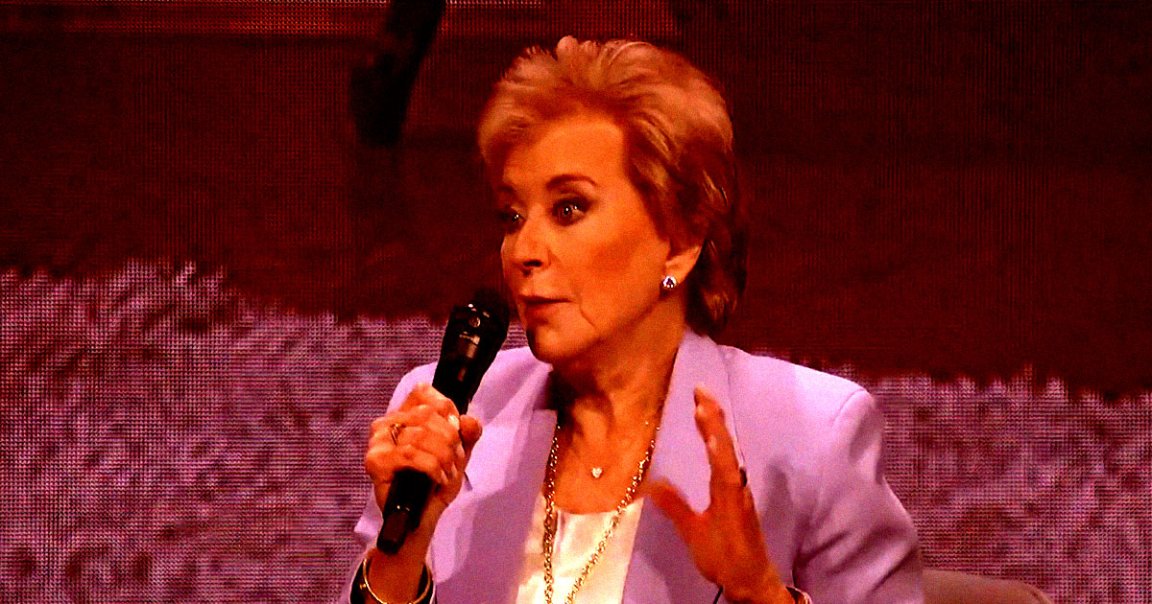
It seems like president Donald Trump’s secretary of education Linda McMahon needs a primer on artificial intelligence.
During an education summit organized by Silicon Valley venture capitalists, the 76-year-old Trump appointee and former professional wrestling promoter repeatedly pronounced “AI” as “A1,” the name of a popular steak sauce produced by Kraft Heinz.
The baffling appearance suggested that McMahon somehow doesn’t know how to pronounce one of the most ubiquitous acronyms in modern society.

“I wish I could remember the source, but there’s a school system that’s going to start making sure that first graders or even pre-Ks have A1 teaching every year starting that far down in the grades,” she told the audience.
“Kids are sponges, they just absorb everything, and so it wasn’t all that long ago that we’re going to have internet in our schools,” McMahon said. “Now, okay, let’s see A1, and how can that be helpful in one-on-one instruction.”
The internet was introduced in US public schools in the mid to late 1990s, well over two decades ago.
Some have raised the possibility that McMahon was talking about the America First Policy Institute, a group she previously chaired that’s sometimes referred to as the “1A Policy Institute”. But she doesn’t appear to mention that group previously during the panel appearance, and the context of the “A1” quotes certainly does seem to be about the possibilities of AI in the education system. (Adding to the confusion, she does pronounce “AI” correctly earlier in the video.)
Regardless, Trump’s secretary of education appears to be woefully unqualified for the job, as she has no experience in education. She’s most prominently known for having founded the corporate entity that eventually turned into World Wrestling Entertainment, Inc., alongside her husband Vince McMahon, in the 1980s.
She also served as the administrator of the Small Business Administration during the first Trump administration.
McMahon’s embarrassing moment is especially troubling because the use of AI in the classroom has proven highly controversial.
Students across the globe have embraced generative AI tools like OpenAI’s ChatGPT with open arms. That’s despite persistent technical challenges, like widespread hallucinations, raising concerns that impressionable young students could be taking inherently flawed and potentially misleading outputs of these AI tools at face value.
Early efforts to introduce AI in the classroom have equally been met with skepticism. Critics argue that human educators can never be genuinely replaced, while proponents say that AI tools could free up their time to focus on more pressing matters.
Teachers are already massively overworked and underpaid, the argument goes, and AI could take some of that load off.
Even more troublingly, a recent study by the educational resource organization Twinkl found that 62 percent of US educators regularly incorporated AI into their work. However, 69 percent of US teachers reported that they had received no formal AI training from their schools, indicating they’re woefully unprepared.
While it remains unclear which initiative McMahon was referring to during her recent appearance, a number of companies have tried to introduce AI tools that allow young elementary, and Pre-K children to generate short stories, or create interactive presentations.
However, relying on AI this early on in a child’s education could have some serious side effects.
“The big question becomes whether children can benefit from those AI interactions in a way that is similar to how they benefit from interacting with other people,” said Harvard Graduate School of Education assistant professor Ying Xu in an episode of the school’s podcast last year.
“There is the excitement that AI has the potential for personalized learning and to help students develop skills for this AI-driven society,” she added. “But like many of you, I share the same concerns about the outlook of this, what we call the ‘AI generation.'”
According to Xu, using AI tools this early runs the risk of children becoming “more attached to AI than to the people around them.”
In short, considering Trump’s secretary of education appears to be uninformed on how to pronounce the acronym “AI,” the government’s ability to shape the role of AI in education in an informed and justified way remains unclear as ever.
Besides, Trump announced plans to dismantle the US education department last month, so these are questions individual states will need to grapple with.
Updated to fix an error about which other participants were on the panel.
More on AI in education: High Schools Training Students for Manual Labor as AI Looms Over College and Jobs